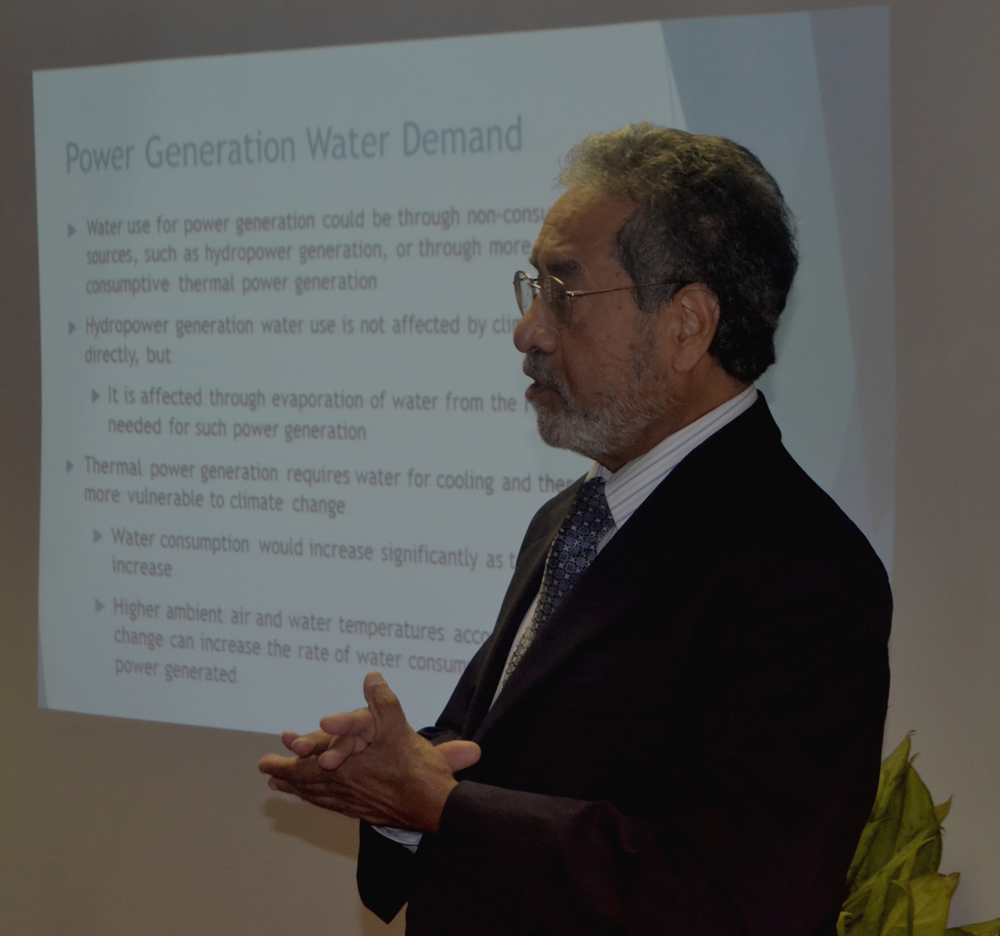Water Scarcity a Major Issue in South Africa

No one can dispute the fact that water is an integral part of the ecosystem.
It is a natural resource that is vital in sustaining life and the environment. Water scarcity and the continued misuse of water pose a serious threat to economic and social development which affects everyone.
This was one of the pivotal points discussed recently during a public lecture by visiting Professor Suren Kulshreshtha at the University of Zululand. The Faculty of Commerce, Administration and Law at UNIZULU hosted the lecture which focused on Water Resources, Climate Change and Sustainability. The Public Lecture was also attended by Professor Desan Iyer, the Deputy Dean in the Faculty of Arts at UNIZULU, as well as students and staff from the Faculty of Agriculture and Science.
Prof Kulshreshtha, an Associate member in the School of Environment and Sustainability, University of Saskatchewan, Canada, as well as Adjunct Professor in the Department of Natural Sciences, Macdonald Campus, McGill University, UK, has participated in several oversees projects in Africa and Asia through the Canadian International Development Agency, and has been an invited participant at several United Nations Environmental Program activities.
Prof Kulshreshtha’s area of expertise is in water resource and irrigation, environmental valuation, drought economic impact assessments and greenhouse gas emission.
South Africa is considered a “water-stressed” country because it has an average annual rainfall percentage of 60 percent of the current world average. In certain dryer areas of the country, this percentage is much lower receiving about 20 percent of rainfall. These rainfall percentages are likely to decrease due to the impact of climate change, globalisation and trade.
“Climate change has severely impacted the vulnerability in water resource management. The detrimental increase of temperature has caused major impact on the hydrological cycles. In some areas, the increase of droughts, floods, the rise of acidity levels in sea water as well as the decrease of crop production are all affected. As a result, the African Penguin is now extinct because of climate change”, said Prof Kulshreshtha.
Yet climate change is not the only contributing factor that is negatively affecting the scarcity of water. The diminishing supply, quality, quantity and distribution of water are also due to globalisation. This is largely due to the rapid changes to water management and related water policies practices as a result of economic trade.
“Globalisation is an overlooked contributor to the continued impact of water scarcity because it will affect major corporates. In particular, subsistence farmers and businesses who export commodities such as sugar cane. Water is not only found in rivers and streams but also plants as an important water source”, said Prof Kulshreshtha.
If South Africa and the globe continue to ignore the pleas from environmentalist, inadequate water distribution will be on the rise as well as a frequency of droughts and floods, prevalent diseases that will affect humans and livestock as well as the decrease of crop production.
According to Prof Kulshreshtha, the best response to combating water scarcity is by recognising water as an economic value. In this way, this economic approach to water management aligns appropriate value to multiple water resources thus, calculating the maximum benefit from these limited resources. This is achieved by viewing water as a natural asset that creates goods and services.
The approach advocated describes the value of water using very conventional categories which are derived from the Total Economic Value (TEV) system. The categories are divided into Use Values and Non-Use Values. These non-use and use values components consist of recreational purposes, consumptive use, removal of pollutants, the availability of water for the future and the preservation water and much more.
To conclude, Prof Kulshreshtha reminded attendees that if water scarcity and the rapid misuse of water problems persist, serious consequences will follow. This will lead to various issues such as human health, food security, the destruction of natural ecosystems and industry related problems.
-Hlumelo Nyikana
Professor Suren Kulshreshtha who delivered a public lecture on Water Resources, Climate Change and Sustainability at UNIZULU recently.














2 Comments
What’s up, after reading this amazing article i am as well cheerful to share
my knowledge here with friends.
Here is my page :: vpn code 2024
Can I simply say what a relief to discover somebody who genuinely knows what they’re talking about
on the internet. You actually know how to bring a problem to light and make it important.
More people need to read this and understand this side of your story.
I was surprised you aren’t more popular given that you certainly possess the gift.
My web-site: vpn coupon 2024